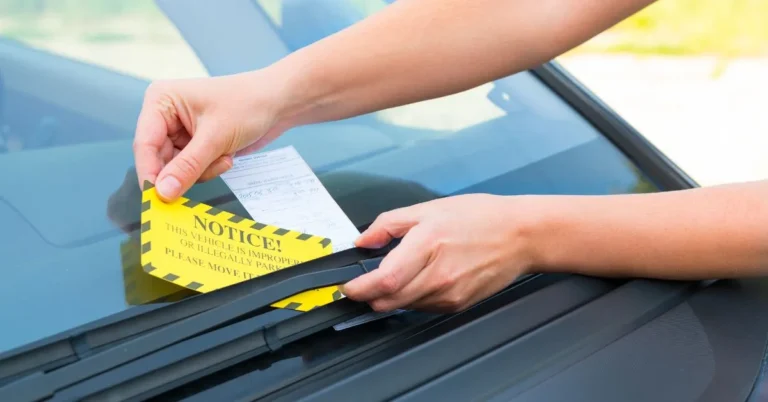Parking tickets are something most drivers will face at least once in their lifetime. Maybe you were running late, misread the sign, or simply forgot to feed the parking meter. Regardless of the reason, the fine lands on your windshield, and now you’re wondering: what happens if you don’t pay a parking ticket?
Ignoring it might seem harmless at first, but unpaid parking tickets can lead to bigger problems than you might expect. In this guide, we’ll explain the potential consequences, how different states handle unpaid tickets, and the best ways to resolve them before they spiral out of control.
Why Parking Tickets Exist
Before diving into the consequences, it helps to understand the purpose of parking tickets. Cities and municipalities issue them to:
- Enforce traffic and parking laws
- Keep roads and public spaces safe and accessible
- Generate revenue for public services
When you don’t pay, you’re not just avoiding a fee — you’re ignoring a legal obligation, and that’s when trouble begins.
Short-Term Consequences of Not Paying a Parking Ticket
At first, missing a payment deadline might not seem like a big deal, but consequences can begin almost immediately.
1. Late Fees and Penalties
Most cities add late fees if you miss the payment deadline, sometimes doubling or even tripling the original fine.
For example:
- A $50 ticket might become $75 after 30 days
- After 60 days, it could jump to $100 or more
The longer you wait, the more you’ll owe.
2. Additional Tickets
If your car is still parked illegally, enforcement officers can issue more tickets. In some cases, they can ticket you daily for the same violation.
3. Loss of Appeal Rights
Most cities give you a limited time to contest a ticket. Once that window closes, you lose the chance to argue your case, even if you were wrongly ticketed.
Long-Term Consequences of Not Paying a Parking Ticket
If you continue to ignore a parking ticket, things can escalate quickly — and the consequences can go beyond just paying more money.
1. Vehicle Booting or Towing
Cities often target repeat offenders. If you have multiple unpaid tickets, your vehicle can be:
- Booted (a wheel clamp that prevents driving until fines are paid)
- Towed and impounded, with storage fees adding up daily
2. Registration Renewal Block
Many states will not let you renew your vehicle registration until all parking tickets are paid. This means you can’t legally drive your car.
3. License Suspension
In some states, ignoring fines long enough can result in a suspended driver’s license.
4. Collections and Credit Impact
Unpaid parking tickets can be sent to collections agencies. While not all parking tickets directly affect your credit score, collections activity can — especially if your state reports unpaid fines to credit bureaus.
5. Court Summons and Legal Trouble
In severe cases, cities can take you to court. Ignoring a court summons can lead to additional legal penalties.
How Different States Handle Unpaid Parking Tickets
While the general consequences are similar, the specific process varies by location.
- California: Unpaid tickets can lead to a registration hold and increased late penalties.
- New York: After 100+ days of nonpayment, your ticket may be sent to collections, and your car may be booted.
- Texas: Cities may issue an arrest warrant for unpaid citations.
- Florida: The DMV can block your ability to renew your driver’s license.
This means it’s important to check your local laws — you might be facing harsher penalties than you expect.
Why Ignoring a Parking Ticket Is a Bad Idea
Many drivers think they can “get away with it” by moving to another state or simply hoping the city forgets. In reality, parking violations are often linked to your vehicle’s license plate, and unpaid fines can follow you:
- When selling your car (the buyer may see unpaid fines in the vehicle history)
- When moving to another state (some states share ticket information)
- When applying for certain jobs (government roles may check your driving record)
What to Do If You Can’t Pay Right Away
If you truly can’t pay your parking ticket immediately, you still have options:
1. Request a Payment Plan
Many cities offer payment plans to spread the cost over several months.
2. Contest the Ticket
If you believe the ticket was issued in error, gather evidence (photos, witness statements) and request a hearing.
3. Ask About Community Service
Some jurisdictions let you work off fines through community service hours.
4. Seek Fee Reduction Programs
Low-income drivers in some areas may qualify for reduced fines or waived penalties.
Tips to Avoid Parking Tickets in the Future
- Read Signs Carefully: Some parking rules change based on the day or time.
- Set Reminders: Use your phone to track meter expiration times.
- Use Parking Apps: Many cities have apps that allow you to pay and extend parking time digitally.
- Avoid Risky Spots: Don’t park in loading zones, handicapped spots, or expired meter zones.
Frequently Asked Questions
Q1: Can a parking ticket affect my credit score?
Not directly, but if sent to collections, it could impact your score.
Q2: Can I be arrested for not paying a parking ticket?
Not for the ticket itself in most states, but ignoring court orders related to it could lead to arrest.
Q3: Do parking tickets follow me if I move to another state?
Often, yes — especially if your new state shares DMV information with your old one.
Q4: Can unpaid tickets prevent me from selling my car?
Yes, if your title or registration is blocked due to unpaid fines.
Final Thoughts
So, what happens if you don’t pay a parking ticket? The short answer: nothing good. Late fees, collections, license suspension, vehicle towing, and even legal trouble are all possible consequences.
The safest and smartest option is to deal with tickets promptly — whether by paying, contesting, or setting up a payment plan. Not only will this save you money in the long run, but it will also keep you out of unnecessary legal and financial trouble.











